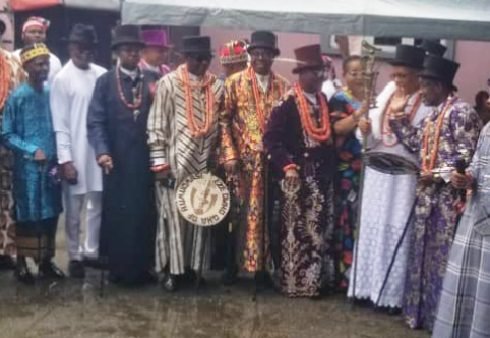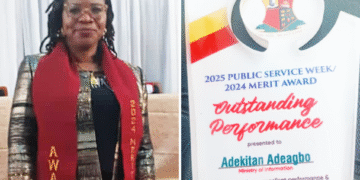In a grand ceremony steeped in cultural colour and national significance, Chief Jubril Dotun Sanusi, the Okanlomo of Yorubaland and Ajia Olubadan of Ibadanland, was on Saturday conferred with the chieftaincy title of Eze Meganu OHA I of Rumuomasi in Obio/Akpor Local Government Area of Rivers State.

The conferment was performed by His Royal Highness, Eze Ezebunwo Geoffrey Adele JP, traditional ruler of Rumuomasi, during an event that drew dignitaries, traditional rulers, youth leaders, business moguls, and cultural enthusiasts from across Nigeria.
The installation of a Yoruba high chief into the Rumuomasi chieftaincy institution is widely seen as a remarkable gesture of national integration and inter-ethnic harmony. It highlights Chief Sanusi’s pan-Nigerian influence and his continued contributions to peace-building, economic growth, and cultural diplomacy.
Eze Ezebunwo Adele, in his remarks, described Chief Sanusi as “a bridge-builder and a man of honour who has demonstrated unwavering commitment to youth empowerment, inter-regional collaboration, and community development across Nigeria.”
Chief Sanusi, an industrialist and philanthropist, is the Chairman of Ilaji Group of Companies and the visionary behind Ilaji Hotels and Sports Resort. He is renowned for his developmental strides in the South-West and his growing influence on the national stage.
Also serving as the National Patron of the Yoruba Council of Youths Worldwide (YCYW), Sanusi has championed unity across ethnic and regional divides, earning admiration for his Omoluabi values and service-driven leadership.
“A Call to National Service”
In his acceptance speech, Chief Jubril Dotun Sanusi thanked the Rumuomasi traditional institution and community for the honour. He dedicated the title to all Nigerians who believe in unity and peaceful coexistence.
“This title is not just for me, but for all Nigerians who believe in oneness. It reminds us that despite our differences, we can build a prosperous future together,” he said.
The colourful ceremony was also marked by traditional displays, cultural dances, and messages of goodwill, underscoring the importance of fostering unity and mutual respect among Nigeria’s diverse ethnic communities.













